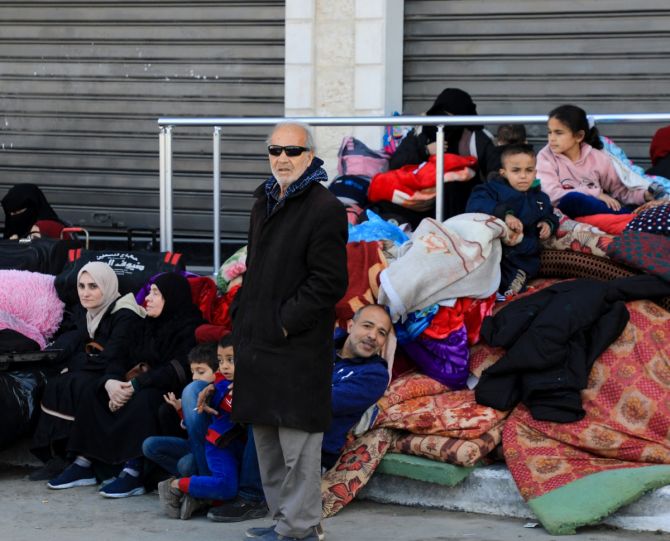India's voting pattern in the United Nations with regard to the Israel-Palestine conflict is lately marked by a calibrated distancing from Israel, observes Ambassador M K Bhadrakumar.

Indian diplomacy is ending 2023 with a momentous turnaround. What began as a course correction necessitated by the torrential flow of events in West Asia is assuming strategic overtones.
Truly, the aberration in India's policies can be traced to the UPA rule (2004-2014) but it is under the period since then 2014 that they accentuated phenomenally and began creating contradictions undermining national interests.
This aberration also led to a serious erosion of India's strategic autonomy in a transformative international environment.
India's voting pattern in the United Nations with regard to the Israel-Palestine conflict is lately marked by a calibrated distancing from Israel.
Only a few weeks ago, Israel's ambassador in Delhi bullishly described the Indian stance as one of '100% support' to his country. But that is no more the case today.
Delhi has rejected the repeated Israeli entreaties to declare Hamas as a terrorist organisation, marking its independent opinion regarding the ecosystem of resistance movements.
Indeed, this is a highly significant distinction that Delhi is making vis-a-vis the Israeli and Western narrative about Hamas. Although India has not hesitated to condemn the violence directed against Israel on October 7, it refused to name Hamas.

Considering that Hamas had a chequered past of receiving patronage from Israel, Tel Aviv has no right to expect Delhi to dance to its tunes.
Equally, Hamas' future is far from an open and shut case. The fact that Sinn Fein and Irish opinion has shown empathy towards Hamas, or that South Africa, which has itself been a victim of apartheid, has recalled its ambassador and diplomatic mission to Israel, calling the horrific Gaza killings as 'genocide', go to show that the embers of national liberation struggle are still burning.
Although India expressed 'solidarity' with the Israeli people over the brutal violence on October 7, it cannot condone the vastly disproportionate Israeli retaliation since then, blithely calling it a matter of Israel's 'right to self-defence'.
On December 13, India voted in favour of a resolution in the UN General Assembly that demanded an immediate humanitarian ceasefire in the Israel-Hamas conflict.
This was the first time India supported such a resolution since the war broke out more than two months ago.
Such a stance puts India on the right side of history, as the 193-member UN General Assembly overwhelmingly adopted the resolution at an emergency special session, with 153 nations voting in its favour.

A third aspect is that from a geopolitical perspective, Delhi has marked its distance from the US-Israeli campaign branding Iran as the instigator of extremist groups acting against Israel.
Interestingly, on December 19, India was one of only 30 states -- along with Russia and China -- who voted against a UN resolution on 'the human rights situation in Iran'.
The running thread here is that India has reverted to its traditional stance on the Palestine problem and jettisoned the tilt supportive of Israeli interests.
The unprecedented unity among the Arab countries, the close coordination between Saudi Arabia and Iran, the huge groundswell of opinion in the Arab world against Israeli atrocities against the Palestinian populations in Gaza and West Bank -- all this has created a new momentum in Middle East politics that has pitchforked the Palestine problem to the centre stage, which is something India cannot afford to ignore.

Nor can Delhi be oblivious of the new reality that something has fundamentally changed in the dynamics of the Palestine problem after the events since October 7.
The Israeli ploys of dissimulation and evasiveness and deliberate wrecking of dialogue process and negotiations may no longer work.
Indeed, Israel's overwhelming military superiority vis-a-vis its Arab neighbours has lost its relevance.
Coupled with the US' loss of influence and America's waning global hegemony alongside the sharp polarisation of opinion within Israel itself internally add up to create grave uncertainties regarding the future of the state of Israel as it exists today.
Suffice to say, India feels the need to adapt to the new conditions in West Asia where regional countries prefer to settle their issues by themselves, which in turn undermines the rationale behind the creation of Israel as a cockpit of Western strategic interests.
The way out of this impasse lies in Israel reinventing itself. But the near civil war conditions in the country won't permit that to happen.

An immediate fallout of all this is going to be that India is unlikely to join the US-led alliance in the Red Sea gearing up to wage a war on terror against the Houthis of Yemen.
This is despite the US efforts to involve the Quad countries in the Red Sea operations.
By the way, both Japan and Australia have dissociated themselves from joining the US-led coalition of the willing.
Once again, Delhi will be guided by the consideration that the US' ill-fated move to use military power against the Houthis has no takers among the regional states.
The US naval enterprise in the Red Sea is struggling to be born. The well-known ex-CIA analyst Larry Johnson has written(external link) that 'On paper it would appear that Yemen is outnumbered and seriously outgunned. A sure loser? Not so fast. The US Navy, which constitutes the majority of the fleet sailing against Yemen, has some real vulnerabilities that will limit its actions.'
Johnson cites the expert opinion of Commander Anthony Cowden, a US naval reserve officer, that given the current configuration of the US Navy as a 'forward-based navy' -- as distinct from an 'expeditionary navy' -- the 'US Navy no longer has sufficient capability for sustaining expeditionary operations.'
After all, the chief of staff of Iran's Islamic Revolutionary Guard Corps Mohammad Reza Naqdi was not far off the mark when he warned last week that the US and its allies are 'trapped' in the Red Sea and should prepare for the closure of waterways stretching all the way to the western gates of the Mediterranean Sea.

The Indian defence and security establishments have been unabashed votaries of India's strategic ties with Israel.
Such excessive adulation of the Israeli model as worthy of emulation by India was built on sheer naivete, completely overlooking that the two countries operate under vastly different conditions and national ethos.
It is patently absurd that India can emulate Israeli methods of brutal repression or assassination as part of Statecraft, apartheid policies and so on and get away with it.
The incidents of October 7 have been an eye opener for Indians, which has exposed not only Israel's frailties as a modern State but also its military's bluster and intelligence's failure.
The acolytes of Israel in the Indian strategic community feel utterly disillusioned. Simply put, an influential constituency in India and the interest groups that it spawned are no longer calling the shots in Delhi. This is going to be consequential.
At the same time, the entire ideological underpinning of the present government's tilt towards the Israeli leadership under Benjamin Netanyahu is unravelling.
In a brilliant essay recently, the well-known French scholar and author on right-wing politics in India, Christophe Jaffrelot wrote in the Indian Express that the emerging India-Israel alliance during the recent years was anchored not only on the two ruling elites' hostility to Islam but also on affinities between Hindutva and Zionism, characterised by 'ethno-nationalist ideologies that prioritise factors like race, territory and nativism.'
Going forward, such affinities are going to be hard for the Indian elite to sustain, leave alone openly flaunt, as Israel turns into an apartheid state and gets battered by the forces of history.
Ambassador M K Bhadrakumar served the Indian Foreign Service for 29 years.
Feature Presentation: Rajesh Alva/Rediff.com










